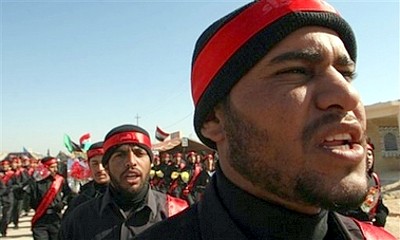Al-Sadr bloc talks of new alliance with Sunnis, Christians
BAGHDAD, Iraq (CNN) -- One day after suspending participation in Iraq's government, the bloc loyal to anti-U.S. Shiite cleric Muqtada al-Sadr announced a possible new political alliance with Sunnis and Christians.
Calling the group a "national front," the head of al-Sadr's bloc in Parliament -- Falah Hassan Shanshel -- said the groups would target the U.N. Security Council's decision to extend the mandate of the 160,000 multinational force in Iraq for another year.
The formation of such an alliance has been in the works for at least two months, said Saleh al-Mutlag, a prominent Sunni politician and vocal critic of al-Maliki.
He called the alliance a nonsectarian, national patriotic front, drawing from different areas of the country and also including secularists, Kurds, Yazidis, Turkmens and clerics.
The group does not include the Mehdi Army, a militia loyal to al-Sadr, al-Mutlag said, adding that he believes the militia should dissolve. He said that al-Sadr himself is "not negative" about the alliance and that it could be achieved peacefully.
Members of the alliance are working with insurgents to get them to lay down their arms, al-Mutlag said. He emphasized that a withdrawal table for U.S. troops would convince insurgents Americans won't stay.
The United States should be talking to members of this grass-roots movement about solving Iraq's problems, al-Mutlag added, saying he believes the government is the cause of the country's problems now.
The al-Sadr bloc's 30 Parliament members and six Cabinet ministers on Wednesday carried out their threat to boycott the government to protest President Bush's meeting with Iraqi Prime Minister Nuri al-Maliki in Jordan.
Members of the country's largest Sunni bloc -- the Iraq Accord Front -- as well as Christian and independent lawmakers contacted the al-Sadr movement after its boycott to announce their solidarity, Shanshel said.
Al-Sadr's group said it will resume government participation when al-Maliki comes up with a timetable for U.S. troop withdrawal. It also wants better security and improvements in infrastructure.
Al-Maliki, who believes disagreements should be addressed within the framework of government, has urged the bloc to reconsider its boycott, calling it "an unproductive turn in the political process."
His spokesman later said that Parliament members may legally suspend their participation, but Cabinet ministers may not -- and must either resign or take leave without pay.
The al-Sadr faction is part of the United Iraqi Alliance, which also includes al-Maliki's party -- the Dawa movement -- and the Supreme Council of the Islamic Revolution in Iraq, a staunch rival of al-Sadr's movement.
It was the issue of federalism that put SCIRI and al-Sadr's people on opposite sides of the camp, with al-Sadr supporters siding with Sunnis in support of a united Iraq, and SCIRI members wanting a Shiite autonomous zone -- similar to the Kurds'.
Read the rest at CNN
Related Link:
Al-Maliki calls for al-Sadr loyalists to end their boycott
Related Link:
Iraq's al-Hakim meets Jordanian King, angers Sunni's with comments
Related Link:
Iraq extends state of emergency, Sunni's complain
Related Link:
Iraq parliament bars media as tension mounts
Related Link:
al-Sadr says Sunni cleric must defuse crisis


<< Home